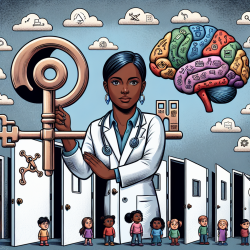Introduction
The field of bilingualism has long intrigued researchers and practitioners alike, particularly in how it impacts cognitive functions beyond language. The research article "On extending experimental findings to clinical application: Never too late? An advantage on tests of auditory attention extends to late bilinguals" by Bak, Vega-Mendoza, and Sorace (2014) offers compelling insights into the cognitive advantages of bilingualism, specifically in auditory attention. For practitioners in special education and clinical settings, these findings open new avenues for enhancing assessment and intervention strategies.
The Bilingual Advantage
The study highlights a significant bilingual advantage in auditory attention tasks, as measured by the Test of Everyday Attention. Bilingual adults outperformed their monolingual counterparts, suggesting that the cognitive benefits of bilingualism extend beyond language skills to include enhanced executive functions. This advantage is not only observed in early bilinguals but also in those who acquire a second language later in life.
Implications for Clinical Practice
For practitioners, these findings underscore the importance of considering bilingualism as a factor in cognitive assessments. Traditional assessment tools, often designed for monolingual populations, may not accurately reflect the capabilities of bilingual individuals. Practitioners should consider the following strategies:
- Adjust Assessment Criteria: Recognize that bilingual individuals may score differently on cognitive tasks. Adjusting criteria to account for the bilingual advantage can lead to more accurate diagnoses and interventions.
- Comprehensive Language Assessments: Assess bilingual individuals in all their languages to capture their full linguistic and cognitive abilities. This approach can prevent misdiagnosis and inappropriate referrals.
- Develop Normative Data: Advocate for the development of normative data specific to bilingual populations to enhance the validity of clinical assessments.
Encouraging Further Research
While the current study provides valuable insights, it also raises questions about the clinical significance of the bilingual advantage in various contexts, such as neurological traumas or neurodegenerative conditions. Future research should aim to:
- Explore Clinical Significance: Investigate whether the cognitive advantages observed in bilinguals translate into better outcomes in clinical settings, particularly for those with neurological conditions.
- Detailed Participant Descriptions: Ensure that studies include detailed descriptions of bilingual participants, including age of acquisition, language use context, and proficiency levels. This information is crucial for replicating studies and applying findings clinically.
- Examine Diverse Bilingual Contexts: Study bilinguals from various linguistic and cultural backgrounds to understand how different contexts influence cognitive advantages.
Conclusion
As practitioners, embracing the cognitive benefits of bilingualism can enhance our assessment and intervention strategies. By adjusting our clinical tools and advocating for research that explores the full scope of bilingual advantages, we can provide more accurate and effective services to our clients.
To read the original research paper, please follow this link: On extending experimental findings to clinical application: Never too late? An advantage on tests of auditory attention extends to late bilinguals.










